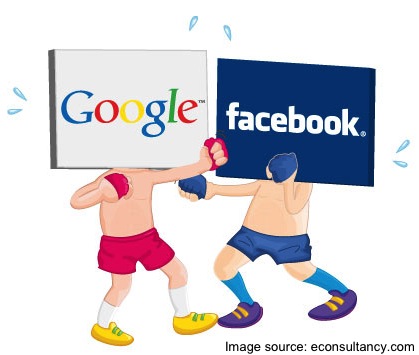I’m often asked how Google and Facebook compare to one another as advertising platforms. The answer comes down to who your audience is, and how and when you need to reach them.
Google’s and Facebook’s ad platforms share several things in common:
1. They represent the vast majority of their company’s revenue.
2. They allow for geography-based targeting.
3. They use an auction style bidding system.
4. They allow for a very precise level of targeting.
Google’s ad network, launched in October 2000, allows advertisers to reach consumers via sponsored search results and display (or banner) advertisements. Facebook’s ad platform, launched in November, 2007, consists primarily of display advertisements.
For the purpose of this article, I’ll compare Google’s search ads to Facebook’s display ads.
This may not be considered a fair apples to apples comparison. Search ads typically outperform display ads when it comes to driving conversions directly off an ad click. This is because search ads hit consumers lower in the sales funnel. Seth Godin coined the term “permission marketing” to describe search engine advertising. When someone does a search for a service or product in Google, they are asking to be advertised to. Display ads are different; display ads try to divert our attention away from something else.
Permission versus Diversion. Permission causes less friction. Permission usually wins.
But this isn’t always the case. There are several situations in which Facebook ads can outperform Google search ads.
Google search ads work by selecting a list of keywords for which you want your ad to show. When someone does a search, your ad shows up and eventually, someone will click on it. It doesn’t matter who you are, how old you are, or which gender you are — ads are served based strictly on what you typed in the search box.
Facebook ads work by selecting the type of person to whom you want your ad displayed. For example: males 25-50 who like football. The ad will display along the right side to users that match that description. Users tend to click display ads much less frequently than search ads, and even when they do, conversion rates aren’t as high.
So if display ads almost always under-perform search ads, why is anyone spending money on Facebook? Let’s look at a few examples:
1) Product: Industrial aeration pumps.
You sell industrial aeration pumps to waste facilities, power plants, and water treatment facilities. Your product caters to a very specific market and the companies you do business with have someone in charge of purchasing equipment.
Recommended ad platform: Google Adwords
Reason: Products that cater to a very specific group perform best in Google Adwords due to the limited competition and high relevance. Customers only purchase this type of product when they need one — otherwise it’s out of mind. For this reason, you should only spend your money when you know someone is ready to purchase.
2. Local sports team tickets.
You are in charge of ticket sales for a local professional sports team. You run regular promotions and giveaways to try to get people into the park. This week you are promoting “Dogs in the Park” night, where fans can bring their dogs into the stadium.
Recommended ad platform: Facebook
Reason: You have strong brand awareness in your market and many local residents have been to at least one game. The promotions you run are designed to bring people back into the park. Most residents are open to attending a game on any given night — you just need to provide the occasional incentive to get them to commit. You set your ads to target adults in your city who include dogs in their interests.
3. Revolutionary urban organic gardening product.
You are marketing a brand new urban organic gardening product. You can’t afford a big media buy and don’t feel confident you can reach your target market via traditional ad channels, given your budget. No one has ever heard of your product, so no one is looking for it.
Recommended ad platform: Facebook
Reason: If people don’t know your product even exists, chances are slim someone will be searching for it in Google (or anywhere, for that matter). Facebook, on the other hand, will allow you to display your ad to those who list organic gardening in their interests and live in a metropolitan area. This precise level of targeting will increase exposure to the right people while driving relevant traffic back to your website.
Choosing the advertising channel that’s best for your business comes down to how your target market uses the web. If you are fortunate enough that potential customers are raising their hand looking for you, move your dollars to search. If demand for your product is passive but can be tightly aligned with a person’s interest, try your hand at Facebook.
No matter what, understand that these are just starting points. Fail fast and fail forward to find out what works best for your business.






Agree, disagree, or just have something to add?
Leave a comment below.